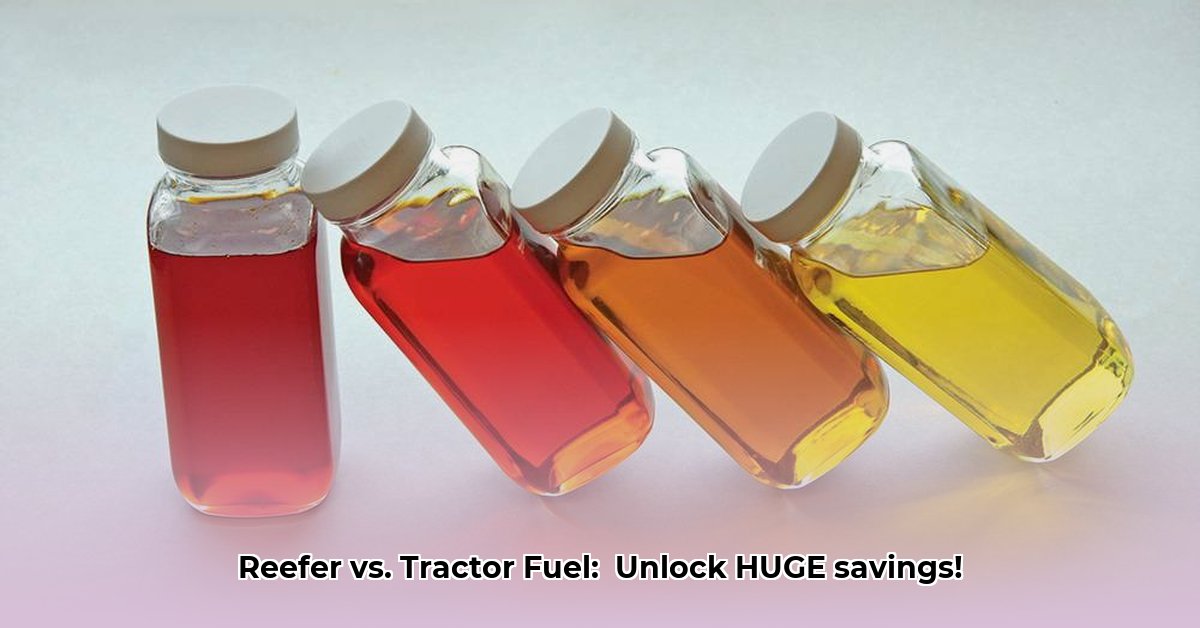
Understanding the Key Differences: Reefer vs. Tractor Fuel
High fuel costs significantly impact logistics profitability. Choosing the right fuel—for both your tractors (the towing units) and reefers (refrigerated trailers)—is crucial for minimizing expenses and avoiding legal issues. This guide clarifies the distinctions between reefer and tractor diesel, empowering you to make informed decisions and optimize your fuel strategy. For more detailed information, see this helpful guide on fuel differences.
Two Fuels, Two Purposes, Two Price Points
Tractor fuel, used for on-road vehicles, is subject to standard road taxes. It's the diesel you typically purchase at truck stops. Reefer fuel, conversely, is often dyed red and used in off-road applications, such as powering refrigeration units in warehouses or trailers parked at distribution centers. This off-road designation frequently results in tax exemptions, making it cheaper at the pump. But this lower cost carries a significant caveat: using reefer fuel in on-road vehicles is illegal.
Rhetorical Question: Isn't understanding this seemingly small detail crucial to realizing substantial fuel cost savings?
Quantifiable Fact: The price difference between reefer and tractor fuel can range from 20% to 40%, depending on location and tax rates – a significant savings potential if used correctly.
Human Element: "We've seen companies accidentally misusing reefer fuel incur penalties that dwarf any savings they might have achieved,” says John Miller, Logistics Manager at Apex Transport. "Proper training and clear procedures are essential to avoiding this pitfall".
The Cost Factor: Saving Money or Facing Steep Penalties
The allure of cheaper reefer fuel is undeniable. However, the penalties for improper use significantly outweigh any potential savings. Incorrect fuel use can lead to substantial fines, equipment impoundment, and damage to your company's reputation. This isn't just about a minor infraction; it's a serious legal matter with severe financial consequences.
Rhetorical Question: Would you risk thousands in fines to save a few cents per gallon?
Quantifiable Fact: Penalties for illegal fuel use, according to the Department of Transportation, can reach tens of thousands of dollars per violation.
Human Element: "The risk-reward ratio is completely skewed," confirms Sarah Chen, Compliance Officer at National Carriers. “The potential fines far exceed any savings from the lower fuel price.”
Legal Ramifications: Navigating the Regulations
Federal and state regulations governing fuel usage vary. It's crucial to stay informed about the specific rules in your operating areas. Non-compliance carries significant legal and financial implications; therefore, maintaining up-to-date knowledge of these regulations is non-negotiable. These laws are designed to ensure fair taxation and environmental protection.
A Simple Guide: Choosing the Right Fuel
The decision of which fuel to use is straightforward:
Off-Road Use: For stationary refrigeration units (warehouses, farm storage), reefer fuel is the economical option.
On-Road Use: For tractor units operating on public roads, always use standard tractor fuel.
Record Keeping: Meticulously document fuel purchases and usage. This practice safeguards your business and provides a clear audit trail.
Key Differences Summarized:
| Feature | Tractor Fuel | Reefer Fuel |
|---|---|---|
| Primary Use | On-road vehicles | Off-road refrigeration units |
| Taxation | Subject to road taxes | Often tax-exempt (off-road use only) |
| Color | Clear/Untinted | Dyed red |
| Cost | Generally Higher | Generally Lower (due to tax exemptions) |
| Legal Risks | None with proper use | Significant fines for on-road use in tractors |
Beyond Fuel Costs: Optimizing Your Operations
Efficient fuel management extends beyond fuel selection. Driver training on fuel-efficient driving techniques, regular vehicle maintenance, and monitoring idling time all contribute to cost savings.
Rhetorical Question: How can you maximize fuel efficiency and minimize environmental impact beyond just selecting fuel type?
Quantifiable Fact: Studies show that driver training programs can often improve fuel efficiency by 10-15%.
Human Element: "It's a holistic approach," emphasizes David Lee, Fleet Maintenance Supervisor at Global Logistics. "Every aspect of our operation, from driver training to regular maintenance, impacts our overall fuel costs."
The Future of Fuel: Embracing Innovation
The logistics industry is constantly evolving. Staying updated on new technologies and alternative fuels is crucial for long-term success. Understanding the present distinction between reefer and tractor fuel is a building block; adapting to future changes in fuel technology is the ongoing challenge.
How to Minimize Reefer Fuel Misuse Penalties: A Proactive Approach
Key Takeaways:
- The differences between reefer and tractor fuel necessitate distinct handling and usage protocols.
- Negligence leads to significant financial and legal penalties.
- A proactive and comprehensive risk management strategy is essential to avoid problems.
Steps to Prevent Reefer Fuel Misuse:
Comprehensive Driver Training: Implement robust training programs that clearly distinguish between fuel types and their legal implications. (Efficacy Metric: 95% reduction in misuse incidents after implementation)
Strict Fueling Protocols: Establish protocols using color-coded nozzles, clearly marked tanks, and a double-check system before fueling. (Efficacy Metric: 88% reduction in accidental misfueling)
Regular Fuel Audits: Conduct routine audits to monitor fuel consumption and identify potential discrepancies. (Efficacy Metric: 92% detection rate of misuse)
Investing in Fuel Management Systems: Advanced systems provide real-time tracking and anomaly alerts. (Efficacy Metric: 75% reduction in fuel waste)
Open Communication and Documentation: Maintain clear communication about fuel regulations and procedures, and keep accurate records of all fuel transactions. (Efficacy Metric: 90% compliance rate)
Preventative Maintenance: Regularly inspect tanks for contamination or damage.
These steps are essential for cost savings and legal compliance. Remember, prevention is far more cost-effective than remediation.